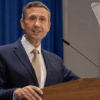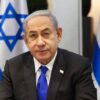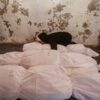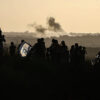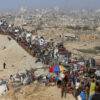I was driving home from the People’s Conference for Palestine in Detroit when family in Prague sent an invitation for me to join a Stolperstine placement ceremony.
Stolperstines are memorial stones set into the pavement outside the last voluntary residence of victims of the Nazi genocide. The daughter of my grandmother’s cousin “J” commissioned this Stolperstine in memory of the grandparents she never knew.
A few years ago, while translating family letters written from Nazi-occupied Prague, I got to “know” this couple – my great-grandmother’s brother “R” and his wife “M.” They were urban, middle class assimilated Jews. After two and a half years of forced displacements during the Nazi occupation, the loss of income and crippling restrictions on their lives, they and most of my family were deported to a “ghetto” concentration camp outside the city and from there shipped to killing sites in Poland and Belarus.
I grew up under the weight of this genocide which everyone referred to as “The Holocaust.”
I grew up at a distance, however, because my grandparents and father were lucky to escape and it was rarely discussed in my family. My grandmother’s cousin “J,” who was twenty-two when he was deported, survived in a labor camp and returned to Prague. It took a few years before his wife, also a concentration camp survivor, recovered enough strength to have a baby. That’s my cousin, who decades later would order the Stolperstine for the grandparents she never knew. Unlike me, she grew up at the scene of Nazi crimes.
We’d been in touch sporadically over the years, especially after I started digging into family history. In the spring of 2023, there was brief talk of a reunion.
That fall, all my energy turned to Gaza.
A New Years greeting card arrived in December. “Prague 2024!” I almost didn’t notice it, buried among dozens of emails reporting relentless Zionist atrocities.
Would we visit beer halls, join throngs of tourists at the Old Town Hall where my grandparents married, take selfies on the medieval stone arch Charles Bridge that spans the Vltava River, while the Zionists dropped U.S.-made bombs on two million Palestinians, destroyed hospitals and schools, disappeared and tortured doctors, and obliterated ancient buildings in the name of “self defense”?
I could not imagine myself making such a trip, being lighthearted or celebrating our togetherness.
Our emails are never very long or detailed. When I told her I couldn’t make the trip, that I was putting all my energy into protesting Israel’s genocide of Palestinians, her response was simply, “I support Israel.”
I sent a link to an interview with an elderly survivor of the Nazi German genocide, someone who knew a genocide when he saw one and called out the Zionist entity’s crimes for what they are.
I did not hear from her again until this Stolperstine invitation, eighteen months later. Eighteen months and how many tons of bombs, how displacements and deaths later?
I wished her love and declined based on a legitimate medical excuse, but I could not leave it at that.
“Every day I honor the memory of our family killed in the Nazi genocide by working for an end to Israel’s genocide of Palestinians,” I wrote back. “Israel is committing this genocide in the name of our family and all Jews. It is another holocaust. I believe if my grandmother was alive today, she would be protesting in the streets along with me.”
There is so much more I would have liked to say. That I am just not in the mood, having already spent nearly two years protesting another genocide, and one that feels really personal.
That Israel justifies its existence on the suffering of all Jews, including our family. That had Zionists not forcibly expelled indigenous Palestinians from land they’d inhabited for thousands of years, had Zionists not embarked on a project to erase Palestinian culture, history and people, there would be no Israel. That they created a racist apartheid state where genocide is so normalized that most Westerners don’t even realize its been ongoing since well before 1948.
That Palestinians, as the occupied people, have a right to resist by any means necessary, including armed struggle, and that we should celebrate their acts of resistance, just as we celebrate the Jews who fought in the Warsaw Ghetto uprising, and the Jewish prisoners who staged a revolt at Treblinka, where my great-grandparents were murdered.
But I didn’t get into all that, didn’t say that the Zionists are flattening homes throughout the West Bank, forcing farmers off their land into urban ghettos, building more illegal settlements in the biggest land grab since 1967, all while turning Gaza into a wasteland, destroying everything needed to sustain life, incinerating and shredding human flesh while those who escape bombs face death by starvation.
Nor did I ask if the genocidal language sounded familiar, because just as Zionist leaders call for the complete annihilation of every Palestinian from newborn babies to elderly survivors of the 1948 Nakba, the leaders of the Third Reich voiced the same intent for all Jews.
So many families would rather avoid controversial topics. “The world is turning upside down,” she replied. Her brief response blamed Trump for just about everything and Putin for violating Polish airspace. There was no mention of genocide, either of Jews or of Palestinians.
Our family did not live their entire lives under occupation, as Palestinians do. They had good lives, until Hitler came to power and then they lived with trepidation until Czechoslovakia was occupied and then they went through hell. No one should have to go through that.
But it wasn’t seventy-seven years of occupation.
In the corner of my room is a suitcase filled with photo albums, some over a century old. Pictures of our family enjoying holidays in the mountains, weddings, smiling babies and toddlers. When I look at that suitcase, I think of Palestinians whose homes are now piles of rubble, every cherished photograph gone.
My life will always be marked by genocide. I wish my grandmother, with whom I always felt a special connection, did not have to live the rest of her life with survivor’s guilt, with that huge weight on her shoulders, the sadness in her eyes, the chronic post-traumatic stress. I wish chronic depression had not plagued my father, who became a refugee at nine years-old. I wish my cousin could have known her grandparents.
But rather than dwell on those losses, I choose to commemorate our family’s lives by doing all I can to stop this genocide, the livestreamed one of today. That means fighting for a two-way arms embargo, an end to the occupation, an end to apartheid, for a free Palestine where everyone, regardless of race, religion or ethnicity, can live with dignity.
At the People’s Conference for Palestine, one of the speakers asked us to raise our hands if we have lost something by protesting this genocide. A job, a college degree, social media followers, family or friends. Because Palestine is always on my mind, I have lost the ability to feel connection with those who don’t see its importance. I’ve drifted away. As for those in complete disagreement, I’m open to discussion, but I can’t just put aside Zionist sentiments and be friends.
I’ve lost something, but I’ve gained something far more important. Clarity, determination, a sharpened sense of purpose and a heightened belief in the power of the people. That is worth everything.
What keeps us going is each other. Palestine will be free.
By : Jamila Levasseur
Source: Mondoweiss

